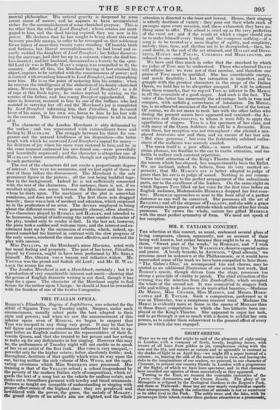THE ITALIAN OPERA.
Rossm's Elisabetta, Regina d' Inghilterra, was selected for the Mitt of Signora Toss on Tuesday night. Singers, under such circumstances, usually select parts the best adapted to their style and powers ; and when we saw the announcement of this inferior opera even of ROSSINI, we began to suspect that Tom was unequal to any thing very great. It may be that her tall figure and expressive countenance influenced her wish to ap- pear before an English audience as the representative of their fa- vourite Queen, and that she trusted to her person and her acting to make up for any deficiencies in her singing. However this may be, the performance of Tuesday night will not enable us to speak of her as an artist of the first rank. Her voice is very unequal,— powerful only for the higher octave; below, absolutely feeble ; and, throughout, destitute of that quality which wins its way upon the ear, having neither the rich volume of Mrs. WOOD, nor the capti- vating sweetness which Miss STEPHENS once possessed. Her training is that of the VELLUTI school ; a school (engendered by the poverty of the modern Italian style of composition), which re- gards the text of a song but as the vehicle for endless volate, and decks out a threadbare garment with tawdry and tinsel ornaments. Persons so taught are incapable of understanding or singing with proper effect music of the highest class : they are perplexed and bewildered with the power, the grace, the melody of MOZART; tte grand objects of an artist's aim are slighted, and the-whole attention is directed to the least and lowest. Hence, their singing is utterly destitute of variety : they pour out their whole stock of passages upon every occasion, and, these exhausted, they have no- thing more to offer. This school is cried up as the very perfection of the vocal art ; and if the result at which a singer should aim be to make himself every thing and the composer nothing,—if a song is to be treated as a mere display of agility, and simplicity, melody, time, tune, and rhythm are to be disregarded,—then, be- yond doubt, is the end of the art attained, and MOZART and DONI- ZETTI, HAYDN and PACINI, CIMAROSA. and MERCADANTE, are reduced to one common level.
We have said thus much in order that the standard by which we judge of Toss may be understood. Those who admired DAVID, will admire her : we were not of that number, and therefore our praise of Toss must be qualified. She has considerable energy, and much flexibility ; but her intonation is imperfect, and to grapple with the greatest characters in the range of the Italian Opera, we hold her to be altogether unequal. It will be inferred from these remarks, that we regard Toss as inferior to DE MERIC in all the essentials of a good singer. And such is the fact. The voice of the latter has immensely the advantage both in tone and compass, with unfailing correctness of intonation. DE MERIC, too, is an educated musician of the best school ; Toss of the lowest. Of course, we do not mean to rank her with the other ladies who during the present season have appeared and vanished—the AL- BERTINIS and GRANDOLFIS, to whom it were folly to apply the appellation of singers. Toss is a fair specimen of her class, and with many of the Opera habitues she will be a favourite. Even with these, her reception was not triumphant : she elicited a mis- placed benissimo now and then, and an encore of her last aria " Bel alme generose ;" but even the fashionably subdued enthu- siasm of the audience was scarcely excited.
The opera itself is a poor affair,—a mere collection of Ros- sinian phrases, too familiar to the ear to excite attention, and too feeble to endure such constant repetition. The chief attraction of the King's Theatre during-that part of the season which has elapsed, has unquestionably been the Ballet. We are inclined, indeed, to believe, from its very marked su- periority, that Mr. MASON'S eye is better adapted to judge of grace than his ear is to judge of sound. Nothing in our remem- brance has come up to the perfect arrangement of the subordinate parts, nor to the excellence of the leaders. On the same night on which Signora Toss lifted up her voice for the first time before an English audience, Mademoiselle HEBERLE dropped her first cour- tesy. HEBERLE approaches as near to the beau ideal of a perfect danseuse as can well be conceived. She possesses all the art of BRUGNOLI and all the elegance ofTaGssicvs, and she adds a grace of expression to her graces of attitude which neither of her fair rivals possesses. To crown the whole, nature has gifted HEBERLE with the most perfect symmetry of form. We need not speak of her reception.


























 Previous page
Previous page